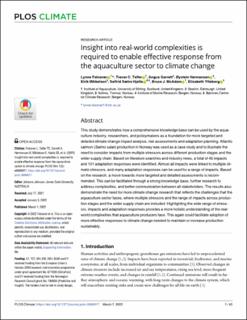| dc.contributor.author | Falconer, Lynne | |
| dc.contributor.author | Telfer, Trevor C. | |
| dc.contributor.author | Garrett, Angus | |
| dc.contributor.author | Hermansen, Øystein | |
| dc.contributor.author | Mikkelsen, Eirik Inge | |
| dc.contributor.author | Hjøllo, Solfrid Sætre | |
| dc.contributor.author | McAdam, Bruce J. | |
| dc.contributor.author | Ytteborg, Elisabeth | |
| dc.date.accessioned | 2022-03-07T07:19:16Z | |
| dc.date.available | 2022-03-07T07:19:16Z | |
| dc.date.created | 2022-03-03T09:46:38Z | |
| dc.date.issued | 2022 | |
| dc.identifier.citation | PLoS Climate. 2022, 1-42. | |
| dc.identifier.uri | https://hdl.handle.net/11250/2983269 | |
| dc.description.abstract | This study demonstrates how a comprehensive knowledge base can be used by the aquaculture industry, researchers, and policymakers as a foundation for more targeted and detailed climate change impact analysis, risk assessments and adaptation planning. Atlantic salmon (Salmo salar) production in Norway was used as a case study and to illustrate the need to consider impacts from multiple stressors across different production stages and the wider supply chain. Based on literature searches and industry news, a total of 45 impacts and 101 adaptation responses were identified. Almost all impacts were linked to multiple climate stressors, and many adaptation responses can be used for a range of impacts. Based on the research, a move towards more targeted and detailed assessments is recommended. This can be facilitated through a strong knowledge base, further research to address complexities, and better communication between all stakeholders. The results also demonstrate the need for more climate change research that reflects the challenges that the aquaculture sector faces, where multiple stressors and the range of impacts across production stages and the wider supply chain are included. Highlighting the wide range of stressors, impacts and adaptation responses provides a more holistic understanding of the real-world complexities that aquaculture producers face. This again could facilitate adoption of more effective responses to climate change needed to maintain or increase production sustainably. | |
| dc.language.iso | eng | |
| dc.title | Insight into real-world complexities is required to enable effective response from the aquaculture sector to climate change | |
| dc.type | Journal article | |
| dc.description.version | publishedVersion | |
| dc.source.pagenumber | 1-42 | |
| dc.source.journal | PLoS Climate | |
| dc.identifier.doi | 10.1371/journal.pclm.0000017 | |
| dc.identifier.cristin | 2007200 | |
| dc.relation.project | EU – Horisont Europa (EC/HEU): 677039 | |
| dc.relation.project | Norges forskningsråd: 194050 | |
| cristin.ispublished | true | |
| cristin.fulltext | original | |
| cristin.qualitycode | 0 | |
